Low-frequency stimulation induces a pathway-specific late phase of LTP in the amygdala that is mediated by PKA and dependent on protein synthesis
- PMID: 17626908
- PMCID: PMC1934345
- DOI: 10.1101/lm.593407
Low-frequency stimulation induces a pathway-specific late phase of LTP in the amygdala that is mediated by PKA and dependent on protein synthesis
Abstract
Activity-dependent changes in synaptic efficacy are thought to be the key cellular mechanism for the formation and storage of both explicit and implicit memory. Different patterns of stimulation can elicit different changes in the efficiency on excitatory synaptic transmission. Here, we examined the synaptic changes in the amygdala of adult mice produced by low-frequency stimulation (1 Hz, 15 min, LFS). We first compared the synaptic changes induced by LFS in three different synaptic pathways of amygdala: cortical-lateral amygdala, thalamic-lateral amygdala, and lateral-basolateral amygdala pathways. We find that the plastic changes induced by LFS are different between synaptic pathways. Low-frequency stimulation selectively elicits a slow onset and protein synthesis-dependent late-phase LTP in the cortical-lateral amygdala pathway, but not in the thalamic-lateral or lateral-basolateral pathways. We next analyzed LTP induced by LFS in the cortical-lateral amygdala pathway and found that three PKA-coupling neurotransmitter receptors are involved: 5-HT4, Dopamine D1, and beta-adrenergic receptors. Antagonists of these receptors block the LFS L-LTP, but the effects of agonists of these receptors are clearly different. These results indicate that the threshold for the induction of LFS L-LTP is different among these pathways and that the maintenance of LFS L-LTP requires a cross-talk among multiple neurotransmitters.
Figures

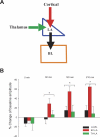
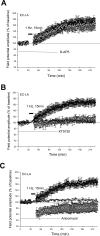
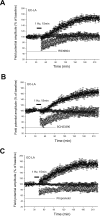
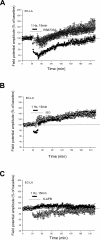
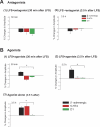
References
-
- Amorapanth P., Ledoux J.E., Nader K. Different lateral amygdala outputs mediate reactions and actions elicited by a fear-arousing stimulus. Nat. Neurosci. 2000;3:74–79. - PubMed
-
- Asan E. The catecholaminergic innervation of the rat amygdala. Adv. Anat. Embryo. Cell Biol. 1998;142:1–118. - PubMed
-
- Bach M.E., Barad M., Son H., Zhuo M., Lu Y.-F., Shih R., Mansuy I., Hawkins R.D., Kandel E.R. Age-related defects in spatial memory are correlated with defects in the late phase of hippocampal long-term potentiation in vitro and attenuated by drugs that enhance the cAMP signaling pathway. Proc. Natl. Acad. Sci. 1999;96:5280–5285. - PMC - PubMed
Publication types
MeSH terms
Substances
Grants and funding
LinkOut - more resources
Full Text Sources
